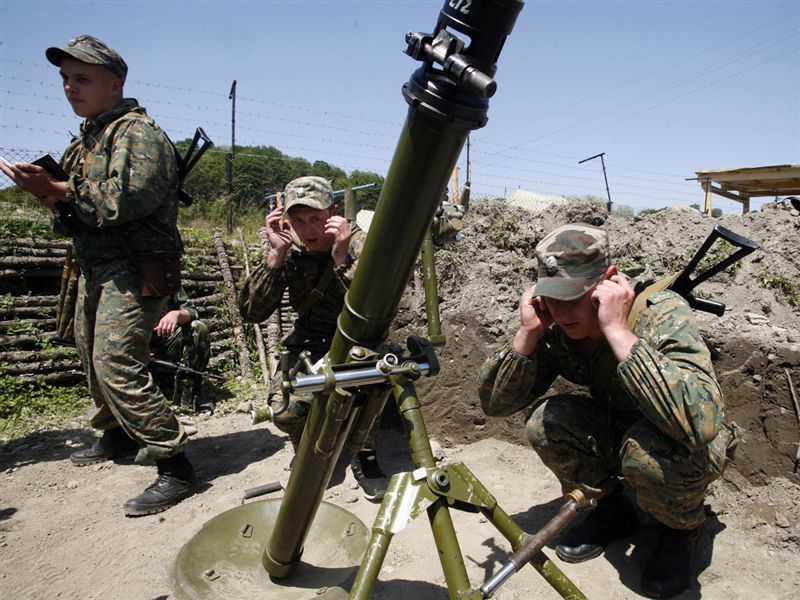
Russian Military Digs in for the Long Haul in Georgian Territories
Publication: Eurasia Daily Monitor Volume: 6 Issue: 169
By:

On September 15 in Moscow, the Russian Defense Minister Anatoly Serdyukov signed agreements on military cooperation with the "defense ministers" (Russian citizens Kishmaria and Tanayev) of Abkhazia and South Ossetia. On the same occasion Russia’s Border Guard Service command, subordinated to the Federal Security Service (FSB), announced that border guard units have been fully deployed to Abkhazia and South Ossetia; and that the Russian coastal guard is taking over the protection of Abkhazia’s maritime "border" in the Black Sea.
These agreements and deployments defy the French-brokered, European Union-endorsed armistice documents of August and September 2008, which had required the withdrawal of forces to positions they held prior to the outbreak of the war. Russia, however, has violated the armistice de facto through the continued stationing of substantial forces in both territories. The September 15 agreements, moreover, endow those violations with a Russian "legal" veneer (and even an Abkhaz and South Ossetian "legal" veneer, from Moscow’s standpoint). The Russian defense ministry has provided summaries of the agreements for Russian media (Interfax, ITAR-TASS, September 15).
The military cooperation agreements with Abkhazia and South Ossetia are valid for 49 years, with automatic prolongations by successive five-year periods afterward. Under these documents, Russia shall "build, use, and improve bases and other military infrastructure" in Abkhazia and South Ossetia. The Russian ground troops’ strength will amount to 1,700 in South Ossetia and an additional 1,700 in Abkhazia, apart from border troops and the coastal guard. Additionally, the Russian military will be in charge of "air space security and control."
The main bases and headquarters will be located [as they already are] in Tskhinvali and Gudauta (Russia had accepted in 1999 an obligation to evacuate the Gudauta base in 2001, but the OSCE failed to ensure its implementation). Russia will also be in charge of "organizing inter-state military transportation" (apparently denoting Russian discretionary use of the railroads, ports, and roads for military purposes).
The Russian military will also be in charge of "coordinating confidence-building measures." This point seems to imply Russian supervision of Abkhaz and South Ossetian responses to the E.U.-proposed confidence-building measures along the respective demarcation lines.
The Russian military will create "joint groups of forces" (a Soviet/Russian term denoting minor allies under Russian command) in the two territories, in peacetime and wartime. Russia will equip and train Abkhaz and South Ossetian troops, as well as seconding Russian military and technical specialists to serve with those local troops. Under this framework agreement, Russia will enter into follow-up agreements with Abkhazia and South Ossetia regarding "military-technical cooperation" (i.e., arms deliveries) and other technical aspects (ITAR-TASS, Interfax, September 15).
Concurrently with the defense ministry’s signing ceremony, Russia’s coastal guard command made public some of its ongoing activities and plans for Abkhazia. Lieutenant-General Viktor Trufanov, the Deputy Head of the Russian Border Guard Service and head of its coastal guard, announced that more than 1,000 border troops are currently serving in Abkhazia (a similar number is known for Russian border troops in South Ossetia). Trufanov’s briefing focused on the maritime mission for Abkhazia, which is now getting under way there.
Ships and boats from the Russian coastal guard’s Black Sea-Azov Sea division have been assigned to protect "Abkhazia’s waters." Their declared role is to intercept and detain "intruder ships from Georgia, off the coast of Abkhazia" as part of a general mission "to guarantee the security of the Russian state and the Abkhaz state." The Russian side claims to be "acting in accordance with the law" (unspecified). However, Russian law does not apply here; Abkhaz law cannot exist, and international law recognizes Georgian sovereignty.
The Russian command intends to complete by November the basing arrangements for coastal guard ships and boats at Ochamchire, in the southern part of Abkhaz-claimed territory. It also plans to install a shore-based radar with 100 percent coverage of the waters. Work to upgrade the Soviet-era naval base at Ochamchire had begun last October, but was delayed by underfunding when the economic crisis hit (Interfax, ITAR-TASS, September 15).
In mid-August, a Georgian coastal guard boat intercepted a Turkish commercial vessel bound for Abkhazia with a contraband cargo of fuel products. The incident was resolved in early September through diplomatic channels. Moscow and Sukhumi reacted vociferously to the Georgian move and continue to protest to this day, although the interception took place on the high sea. In this light, Russia’s stated goal to fend off Georgian ships "in Abkhaz waters" is implausible, and almost certainly misleading. The real goal appears to be protection of third-party shipping engaged in illegal trading with the unrecognized Abkhaz authorities.




